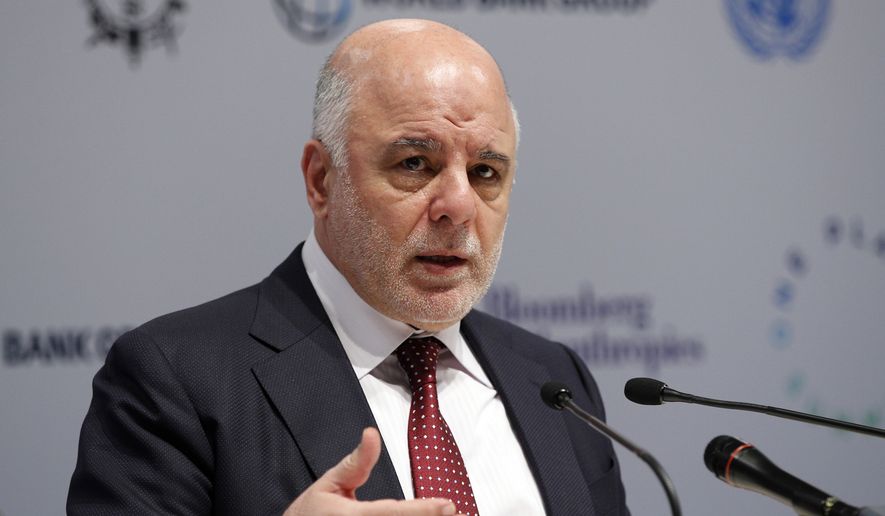The heads of several powerful Iranian-backed militias in Iraq are banding together to form a Shia political movement, designed specifically to take on the ruling party of Prime Minister Haider al-Abadi in May’s parliamentary elections.
The new Iraqi political faction, dubbed the Mujahedeen Coalition, includes representatives from the Shia-led Badr Organization, Asa’ib Ahl al-Haq, also known as the Khazali Network, Kata’ib Hezbollah and other Shia militias that battled Islamic State under the Popular Mobilization Forces (PMF) banner.
The move threatens to exacerbate sectarian strains in Iraq and increase concerns about Iranian influence at a time when Baghdad is already clashing with the Kurds over its authority in the north.
“These are the same groups that have been trained and supported by Iran for the last decade,” going back to the Saddam Hussein era in Iraq, said Ahmad Majidyar, director of the Middle East Institute’s Iran Observed Project.
Officially established in late November, the new coalition seeks to leverage the militia’s battlefield victories against Islamic State over the last three years into political clout within the Iraqi parliament. A successful bid by the Mujahedeen Coalition to secure seats in the Iraqi parliament could fracture Mr. Abadi’s delicate balance of power inside Iraq, which has sizable Sunni and Kurdish minorities, in addition to other smaller ethnic groups.
During a pair of visits to Tehran, Mr. Abadi received two requests from Mr. Khamenei: Do not allow U.S. forces to stay in Iraq after the Islamic State’s defeat and do not disband the PMFs, Mr. Majidyar said.
“If [Ayatollah Khamenei] ordered, they would be willing to topple the government in Baghdad,” Mr. Majidyar said, quoting leaders of the groups in the new political coalition.
Baghdad had sought to circumvent the militias’ role by banning the participation of armed groups in the country’s parliamentary elections, slated for May. But representatives in the coalition resigned their posts before joining the political process, skirting Mr. Abadi’s attempts. Critics say the resignations are little more than a ruse, with coalition leaders continuing to hold sway over their forces.
“They still remain the de facto leaders of those groups,” Mr. Majidyar said.
Iran had already begun fostering the militias’ political ambitions long before Islamic State’s defeat last year. Military advisers with the Iranian Revolutionary Guards Corps and the Corp’ Quds Force were already assisting the militias in political organization efforts outside of Tal Afar and western Mosul, as the militias liberated previously ISIS-held areas during the war, Mr. Majidyar said.
The Pentagon declined to comment on what impact the PMF coalition may have on the Abadi regime or how their role in Iraqi politics could affect the ties between Washington and Baghdad.
“Iraq is a sovereign state and its people will decide the outcome of Iraqi elections,” said Pentagon spokesman Maj. Adrian Rankine-Galloway in an email Wednesday. “Our mission to defeat ISIS and strengthen Iraq’s defense institutions has and will continue with consent of Iraq’s sovereign government.”
There are now an estimated 140,000 fighters under the PMF banner, which constitutes nearly half of the Iraqi army and a quarter of the security forces under the Interior Ministry.
Mr. Abadi put the PMFs under federal control last year, but prominent Sunni Iraqi lawmakers have questioned the paramilitaries’ loyalty to the central government.
Iraqi Vice President Osama al-Nujaifi, the top Sunni official in the government, has openly questioned the loyalties of the Shia militias fighting. “They have their own political aspirations, their own [political] agendas. … They are very dangerous to the future of Iraq,” said Mr. al-Nujaifi in November.
Secretary General of the Kata’ib Jund al-Imam militia Ahmed al-Asadi, a spokesman for the coalition, said the organization’s goal was simply to field “political figures who will defend the Iraqis in the political process.”
Several militia groups loyal to top Iraqi Shia cleric Ali al-Sistani refused to participate in the new coalition, the Middle East news website Al-Monitor reported. Those groups include the Imam Ali Brigade, the Ali al-Akbar Brigade and the Ansar al-Marjaiya Brigades.
Members of Saraya Al-Salam, the paramilitary wing of influential Iraqi Shia cleric Muqtada al Sadr, have also declined to participate in the new political coalition. Late last year, Mr. Sadr’s force agreed to disband its forces and hand over its cache of weapons to the Iraqi government.
It was the first Shia militia and PMF member to lay down its arms following Islamic State’s defeat.
• Carlo Muñoz can be reached at cmunoz@washingtontimes.com.




Please read our comment policy before commenting.